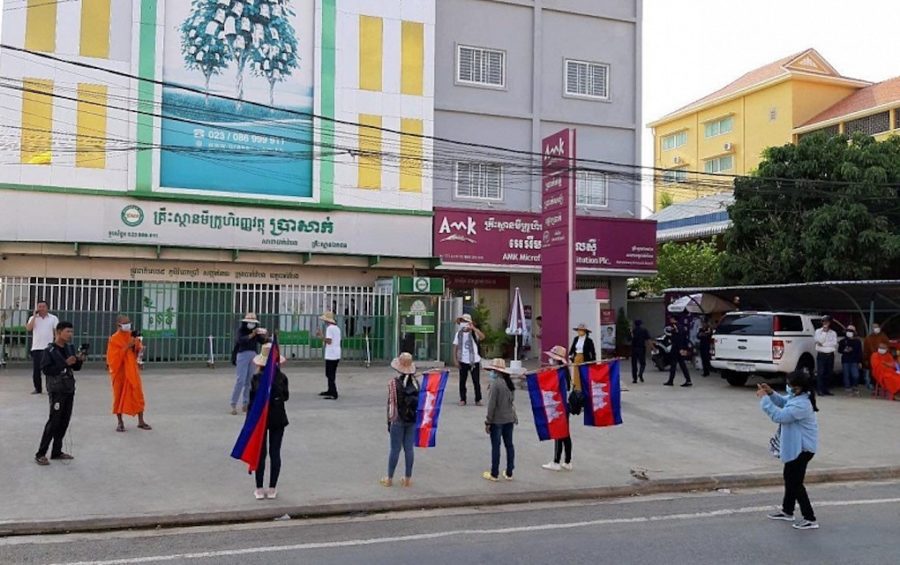Three human rights organizations have filed a complaint against a Netherlands-based microfinance investor on the grounds that it violated international responsible business standards and for years ignored its own evidence of harms linked to predatory lending practices.
Cambodian NGOs Licadho and Equitable Cambodia and international rights group FIAN Germany lodged a 28-page complaint to a Dutch body that oversees and promotes the OECD guidelines — which are standards for multinational businesses — accusing Oikocredit of expanding its practices within Cambodia even as it internally acknowledged the myriad abuses linked to the industry. For months, Oikocredit has also refused to meet with the groups filing the complaint, they wrote.
The complaint, filed to the Dutch National Contact Point for Responsible Business Conduct, calls on the investor to provide compensation to borrowers, make public and explain details of their due diligence and monitoring of Cambodian partners such as Prasac, LOLC and Amret, and suspend investments until land titles taken as collateral are returned to their owners, among other requests.
The investor was founded in 1975 “as an ethical investment channel,” according to its website, and operates in developing countries around the world.
“Oikocredit claims to be a social investor, but their investments in Cambodia have caused irreparable harm to borrowers here,” said Naly Pilorge, Licadho’s outreach director, in a statement released Monday. “Our hope is that this complaint will compel Oikocredit, as well as other so-called ‘social’ or ‘impact’ investors who have fueled this human rights crisis, to fix the harms they’ve contributed to and provide real relief for Cambodian borrowers.”
Several times since 2017 — as abuses within Cambodia’s microfinance industry came under increasing scrutiny from international organizations and journalists — Oikocredit acknowledged human rights concerns in its own annual reports, the complaint says.
That year, the investor was among a group that supported a study on over-indebtedness in Cambodia, which surveyed Oikocredit’s own local partners and documented loan malpractice and debt-fueled food insecurity. Oikocredit cited the study in its annual report that year.
Yet over the next five years, the complaint points to an increase in Oikocredit’s investments in the country and its partnering with microfinance giants such as Prasac, LOLC and Amret — which together make up nearly half of Cambodia’s roughly $16 billion microloan industry. Cambodia is the second-most exposed country in Oikocredit’s portfolio after India, despite having a population of just 17 million to India’s 1.4 billion.
The investor also does not publicly disclose its due diligence practices, which it claims include “environmental, social and governance (ESG) scorecards” and “action plans,” according to the complaint; since 2017, it has not provided evidence that it has improved its due diligence or further examined the potential effects of predatory lending.
As recently as February, after a FIAN report alleged widespread abuse in the sector, Oikocredit released a statement claiming that “microfinance institutions that Oikocredit finances in Cambodia only use land as collateral for large-volume loans to corporate clients,” which the complaint notes is “patently false” given Prasac’s 2021 financial statement showing that nearly its entire $3.748 billion portfolio is collateralised with land titles.
The complaint requests that the Dutch National Contact Point for Responsible Business Conduct help to find a “mutually acceptable solution” and potentially conduct an examination of the allegations.
Oikocredit said on Monday that it was aware of the NGOs’ complaint and would fully cooperate in the process.
“Oikocredit remains confident that our carefully selected partners are fulfilling their agreements with Oikocredit and are committed to best practices in client protection,” it said, adding that it was nevertheless vigilant about sustaining ethical standards.
Oikocredit said it remained committed to investing in Cambodian microfinance as its partners were making a difference to the lives of low-income people.
“Microcredit is not a panacea, and microfinance cannot replace public social services, nor can it alone bring global justice. However, responsible microfinance helps to give economically disadvantaged people the opportunity to shape their lives independently and improve their living conditions,” it said.
Updated at 6:45 p.m. with comment from Oikocredit.













